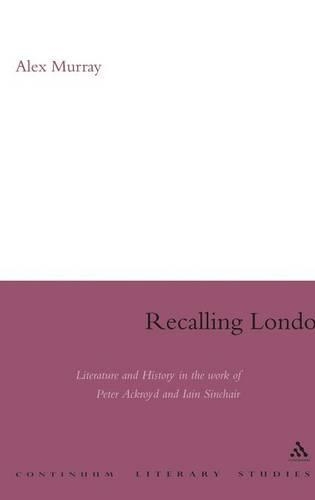
Recalling London: Literature and History in the Work of Peter Ackroyd and Iain Sinclair
(Hardback)
Publishing Details
Recalling London: Literature and History in the Work of Peter Ackroyd and Iain Sinclair
By (Author) Dr Alex Murray
Bloomsbury Publishing PLC
Continuum International Publishing Group Ltd.
21st June 2007
United Kingdom
Classifications
Professional and Scholarly
Non Fiction
823.9140932421
Physical Properties
Hardback
224
Width 156mm, Height 234mm
300g
Description
This monograph undertakes the first extensive comparative analysis of the works of Iain Sinclair and Peter Ackroyd, placing the fiction and non-fiction of both writers in relation to the broader cultural, social and political contexts of London from 1979. It begins by tracing the two different Londons of both writers, arguing that their literary and cultural projects are intrinsically linked, yet have remained under-explored in academic criticism.
Alex Murray argues that that while both Sinclair and Ackroyd attempt to utilise radical narrative practices to challenge the dominant historical discourses within contemporary London, those challenges must be placed in relation to broader issues of cultural history, government appropriation of historical narratives and debates about the relationship between literature and the city. This argument is traced from the radical' historical fiction of the 1980s which launched the career of both writers, through to their extensive bodies of work on creating a specifically London form of literary history, to their engagements towards the turn of the millennium with larger questions of historiography and material history. This study then links these issues of narrative and material history, demonstrating the increasingly problematic relationship that both writers have as their fictionally radical' recalling of London is transformed into issues of material history, primarily the issues of politics and ethics in historical representation, and the relationship between history and commodification.
Reviews
"Murray's knowledge of Ackroyd and Sinclair is exhaustive, and he is spot-on in his analysis of the strategic ambiguities of both writers." Dr. Rod Mengham, Jesus College, University of Cambridge, UK. -- Dr Rod Mengham, University of Cambridge
Murray has written an intelligent though difficult study, and all those with an interest in what is often now called 'public history' will benefit greatly from it. -- Literature and History, 18:1, 2009
Murray's book provides a crucial counter to existing academic criticism of these writers by positioning the formal aspects of their work within its political frame. At a time when the disruptive potential of urban historiography is being subsumed by a wave of generic fiction developed around an East End mythology, he draws our attention to the perpetual necessity of fresh 're-callings' of London. -- Literary London, 6:1, 2008
Author Bio
Alex Murray is Lecturer inTwentieth-Century Literature at the University ofExeter. He isalsofounding editor, with Matt Sharpe and Jon Roffe of Parrhesia: A Journal of Critical Philosophy.
